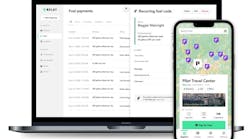The U.S. Federal Highway Administration (FHWA) has published its final report on freight movement and air quality. The study, dubbed “Assessing the Effects of Freight Movement on Air Quality at the National and Regional Level,” reports that freight movement is a major source of national and regional oxides of nitrogen (NOx) and particulate matter (PM) emissions.
Among its findings are that, at the national level, freight transportation accounts for half of mobile-source NOx emissions and 27% of NOx emissions from all sources. Trucking is cited as the major source of freight NOx emissions, accounting for 67% of freight emissions nationally and 77 to 97% of the freight emissions total in the six study regions. The 2007 EPA emission standards for heavy-duty trucks and off-road equipment are expected to dramatically reduce trucking’s relative contribution to these emissions starting in 2007.
The new report also proposes additional studies on:
- How highway improvements that reduce congestion affect emissions
- How operational and technology-oriented strategies can be applied most effectively to reduce idling associated with freight movement.
- How better logistics practices can improve the productivity of freight movement, resulting in less fuel consumption and emissions per ton-mile. The complete text is available at: www.fhwa.dot.gov/environment/freightaq.
The study was prepared by ICF Consulting and led by FHWA project manager Diane Turchetta.


